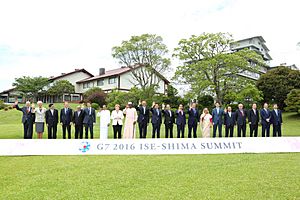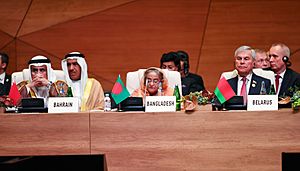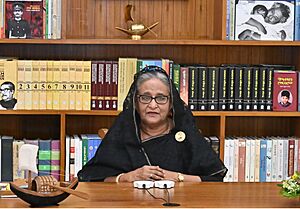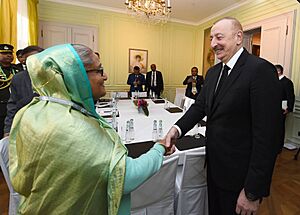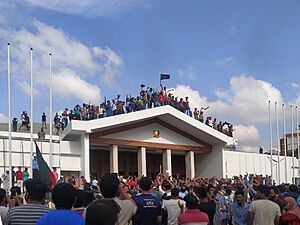Sheikh Hasina facts for kids
Quick facts for kids
Sheikh Hasina
|
|
|---|---|
|
শেখ হাসিনা
|
|
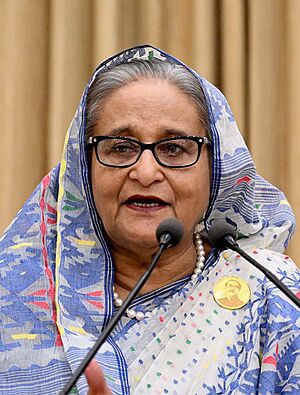
Hasina in 2024
|
|
| 10th Prime Minister of Bangladesh | |
| In office 6 January 2009 – 5 August 2024 |
|
| President | |
| Preceded by | Fakhruddin Ahmed (as Chief Adviser) |
| Succeeded by | Muhammad Yunus (as Chief Adviser) |
| In office 23 June 1996 – 15 July 2001 |
|
| President | |
| Preceded by | Muhammad Habibur Rahman (as Chief Adviser) |
| Succeeded by | Latifur Rahman (as Chief Adviser) |
| 8th Leader of the House | |
| In office 6 January 2009 – 5 August 2024 |
|
| Preceded by | Khaleda Zia |
| Succeeded by | TBA |
| In office 23 June 1996 – 15 July 2001 |
|
| Preceded by | Khaleda Zia |
| Succeeded by | Khaleda Zia |
| 8th President of Awami League | |
| Assumed office 16 February 1981 |
|
| General Secretary |
|
| Preceded by | Abdul Malek Ukil |
| Member of Parliament | |
| In office 12 June 1996 – 6 August 2024 |
|
| Preceded by | Mujibur Rahman Howlader |
| Succeeded by | Vacant |
| Constituency | Gopalganj-3 |
| In office 27 February 1991 – 15 February 1996 |
|
| Preceded by | Kazi Firoz Rashid |
| Succeeded by | Mujibur Rahman Howlader |
| Constituency | Gopalganj-3 |
| 2nd Leader of the Opposition | |
| In office 10 October 2001 – 29 October 2006 |
|
| Prime Minister | Khaleda Zia |
| Preceded by | Khaleda Zia |
| Succeeded by | Khaleda Zia |
| In office 20 March 1991 – 30 March 1996 |
|
| Prime Minister | Khaleda Zia |
| Preceded by | Abdur Rab |
| Succeeded by | Khaleda Zia |
| In office 7 May 1986 – 3 March 1988 |
|
| President | Hussain Muhammad Ershad |
| Preceded by | Asaduzzaman Khan |
| Succeeded by | Abdur Rab |
| Personal details | |
| Born |
Hasina Sheikh
28 September 1947 Tungipara, Faridpur, East Bengal, Dominion of Pakistan (present-day Gopalganj, Bangladesh) |
| Nationality |
|
| Political party | Bangladesh Awami League |
| Other political affiliations |
Grand Alliance (since 2008) |
| Spouse |
M. A. Wazed Miah
(m. 1968; died 2009) |
| Children |
|
| Parents |
|
| Relatives | Tungipara Sheikh family |
| Alma mater |
|
| Awards | Full list |
| Signature | |
Sheikh Hasina Wazed (born 28 September 1947) is a well-known politician from Bangladesh. She served as the prime minister of Bangladesh for two periods: first from 1996 to 2001, and then from 2009 to 2024. She holds the record for being the longest-serving prime minister in Bangladesh's history since its independence. She was also the longest-serving female leader of a government anywhere in the world. She stepped down from her role in August 2024 after widespread public movements. Following this, legal proceedings began regarding her time in office.
Hasina is the daughter of Sheikh Mujibur Rahman, who was Bangladesh's first president. She comes from the important Tungipara Sheikh family. She became more involved in politics after the tragic loss of her father in 1975. She then found safety in India and later became the president of the Awami League party, a position she still holds. After returning to Bangladesh in 1981, she worked with the Awami League to bring back democracy. This led to the 1990 Bangladesh mass uprising and new elections in 1991.
After a close election in 1991, Hasina became the Leader of the Opposition. She raised concerns about the fairness of the election. This led to public demonstrations and political challenges. She was elected prime minister in 1996. After her first term, she was succeeded by Khaleda Zia in 2001. During a period of political challenges from 2006 to 2008, Hasina was held for a time. After her release, her party won the 2008 election, and she began her second term as prime minister.
During her second time as prime minister, there were concerns about how democracy was working and about people's rights. Elections in 2014, 2018, and 2024 faced questions about fairness from international observers. Some politicians and journalists faced difficulties. Reports also raised concerns about the safety of some individuals. Financial reports estimated that a large amount of money was moved out of the country during her time in office.
In 2022, public protests began, asking for Hasina to step down. In July 2024, new student protests started, asking for changes to government job rules. These protests were met with strong responses from security forces, leading to a period of intense public protests where many lives were lost. By August, the protests grew into a large public movement against the government. This led to Hasina stepping down and leaving for India. Legal proceedings concluded with a serious verdict regarding her actions during the protests.
Hasina has been recognized globally. Time magazine included her in its list of the 100 most influential people in the world in 2018. Forbes magazine also listed her among the 100 most powerful women in the world in 2015, 2018, and 2022.
Contents
Sheikh Hasina: A Leader in Bangladesh
Early Life and Family
Growing Up in a Political Family
Hasina Sheikh was born on 28 September 1947 in Tungipara, East Bengal. Her parents were Sheikh Mujibur Rahman and Sheikh Fazilatunnesa Mujib. She spent her early childhood in Tungipara with her mother and grandmother. Later, her family moved to Dhaka.
When her father became a government minister in 1954, the family lived on Minto Road. Her father was also involved in politics and worked for an insurance company. Hasina often spoke about growing up while her father was held as a political prisoner. She mentioned that her father was often jailed because he cared deeply for the people.
Education and Marriage
Hasina went to primary school in her village of Tungipara. In Dhaka, she attended Azimpur Girls' School and Begum Badrunnesa Girls' College. She later studied for a bachelor's degree at Eden College. She was elected as the Vice President of the Students Union at Eden College from 1966 to 1967.
In 1967, she married M. A. Wazed Miah, a Bangladeshi nuclear scientist. Hasina studied Bengali literature at Dhaka University and graduated in 1973. She was active in student politics and was elected as the general secretary of the women's unit in Rokeya Hall.
A Difficult Time for Her Family
In 1975, a very sad event occurred when most of Hasina's family, including her father, passed away. At that time, Hasina, her husband, children, and sister were visiting Europe. They found safety in India and lived there for six years. During this period, she was unable to return to Bangladesh.
In 1981, she was chosen to lead the Awami League party. She then returned to Bangladesh on 17 May 1981. Thousands of Awami League supporters welcomed her home.
Beginning Her Political Journey
Leading the Awami League
While living outside Bangladesh, Hasina was elected President of the Awami League in 1981. This party is known for its moderate political views.
During the 1980s, when martial law was in place, Hasina was often held for short periods. She was under house arrest in 1984 and again in 1985.
Working for Democracy
Hasina and the Awami League took part in the 1986 general election. She served as the leader of the opposition in parliament from 1986 to 1987. She led an alliance of eight parties against the government at the time.
Her decision to join the election was debated, as it was held under martial law. However, her supporters believed she used the platform to challenge the government effectively. In 1987, she and her party resigned from parliament, asking for new elections. A large public movement in 1987 led to several deaths.
Hasina's party, along with the Bangladesh Nationalist Party (BNP), worked to bring back a democratically elected government. They succeeded after a public vote in 1991, which brought back a parliamentary system. The BNP won the 1991 election, and Hasina's Awami League became the main opposition party.
First Time as Prime Minister
Key Achievements and Policies
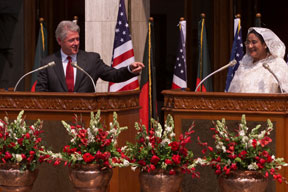

After a period of political challenges, new elections were held in June 1996. The Awami League won many seats, and Hasina became the Prime Minister of Bangladesh. She served from June 1996 to July 2001.
During her first term, she signed a water-sharing agreement with India for the Ganges river. Her government also allowed private companies to operate in the telecommunications industry. In 1997, her administration signed a peace agreement for the Chittagong Hill Tracts, which earned her a UNESCO Peace Prize.
Her government also started the Ashrayan-1 Project to help homeless people. They completed the large Bangabandhu Bridge project in 1998. In 1999, a New Industrial Policy was launched to support private businesses and economic growth.
The economy grew by about 5.5% during her term. Food production increased, and the poverty rate went down. Programs were created to help young people and women with training and credit. An allowance scheme was introduced for elderly people, widows, and distressed women.
Hasina was the first prime minister to have a "Question-Answer Time" in the Jatiya Sangsad (parliament). Her government also made changes to local government systems. Bangladesh joined international groups like BIMSTEC and D-8. She was the first prime minister since independence to complete a full five-year term.
In the 2001 election, the Awami League received a good share of votes but won fewer seats. Hasina and her party raised concerns about the election results. However, international observers generally found the elections to be fair.
Leading the Opposition Again
Facing Challenges and Protests
After the 2001 election, Hasina became the Leader of the Opposition once more. Her party's members did not attend parliament regularly during this time. In 2003, the Awami League started a major movement against the government.
A serious incident happened in August 2004 during a political gathering in Dhaka. This event led to the loss of many lives. Later, legal investigations were conducted into this incident. In 2004, a close advisor to Hasina, SAMS Kibria, also passed away in a similar incident.
In 2005, the Awami League won an important mayoral election in Chittagong, a major city. This was seen as a significant event between the opposition and the ruling party.
A Period of Political Change
In October 2006, Sheikh Hasina and her party organized a large public gathering in Dhaka. This event, known as the 'Boat-hook and Oar Movement,' involved many supporters. It was a time of significant public demonstration.
The period before the planned 2007 elections was filled with political challenges. There were protests and public movements. The interim government faced difficulties in bringing all parties together.
In 2007, the President declared a state of emergency, and a caretaker government took over. Political activities were stopped. During this time, Hasina traveled to the United States and the United Kingdom.
In April 2007, Hasina faced accusations regarding financial matters from the caretaker government. She was accused of taking payments in 1998 for a power plant project. The government also tried to prevent her from returning to Bangladesh, saying her return could cause disorder. However, the ban was later lifted.
On 16 July 2007, Hasina was held by police at her home and brought before a court. She was accused of financial wrongdoing and was held for a period. Her party stated that the arrest was politically motivated. Later, other cases were filed against her.
In June 2008, Hasina was released for medical reasons and traveled to the United States for treatment. The caretaker government held local elections, where the Awami League won most of the mayoral positions.
Second Time as Prime Minister
Important Developments and Challenges
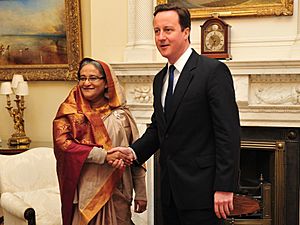
In November 2008, Hasina returned to Bangladesh for the general election on 29 December. She formed a "Grand Alliance" with other parties. In December 2008, she announced her party's plans, promising to build a "Digital Bangladesh" by 2021.
The Awami League and its allies won the 2008 election with a large majority. Hasina was sworn in as prime minister for her second term on 6 January 2009. Independent observers noted that the elections were peaceful.
Early in her term, she faced a challenging situation involving security forces in 2009, which resulted in many deaths. She was praised by some for her handling of the situation. In 2011, the parliament changed the law regarding caretaker governments for elections. In 2012, she maintained a firm stance on allowing Rohingya refugees fleeing Myanmar.
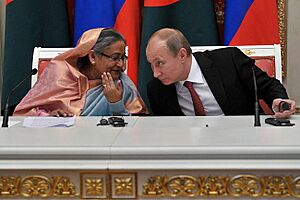
In 2012, she had disagreements with Muhammad Yunus, a Nobel laureate and founder of Grameen Bank. This followed a documentary that raised questions about the bank's finances. Yunus later lost control of his bank after a court decision.
During this term, her government established the International Crimes Tribunal. This tribunal was set up to investigate and prosecute individuals involved in serious events during the Bangladesh Liberation War in 1971.
Focus on Development and Social Programs
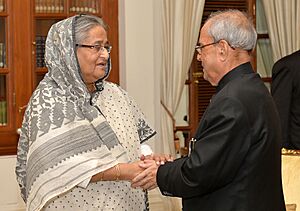
Hasina secured another term in office in the 2014 general election. This election was boycotted by major opposition parties, leading to many seats being won without competition. Her party won a significant majority.
The election was controversial, with reports of public unrest. Hasina stated that despite the boycott, people participated, and the election was legitimate. Her party formed a government with the Jatiya Party as the official opposition.
During this period, there was a rise in attacks by extremist groups in the country. In 2017, Bangladesh launched its first two submarines. In September 2017, Hasina's government provided shelter and help to about a million Rohingya refugees. She received praise for her actions in supporting the Rohingya community.
Hasina also supported calls to remove a statue in front of the Supreme Court. This was seen as a response to religious groups. She is a supporter of the Asian University for Women.
Later Years in Office
Hasina won her fourth term as prime minister in 2019. Her party, the Awami League, won a large number of seats. However, the election results were questioned by the main opposition alliance. Organizations like Human Rights Watch raised concerns about the political environment before the election.
In May 2021, Hasina spoke at the opening of a new headquarters for the Bangladesh Post Office. She encouraged further development of postal services, especially during the COVID-19 pandemic in Bangladesh. This included plans for digital improvements and cooling units for food delivery.
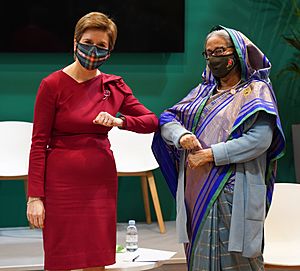
In January 2022, the government passed a law to create a Universal Pension Scheme. This scheme allows Bangladeshi citizens, including those living abroad, to receive a monthly payment after a certain age.
By 2022, Bangladesh's external debt had increased significantly. There were also concerns about irregularities in the banking sector. In July 2022, the government asked the International Monetary Fund for financial help due to decreasing foreign currency reserves. The IMF agreed to provide a support package in 2023.
In December 2022, public protests began due to rising costs, asking for the Prime Minister's resignation. On 28 December, Hasina opened the first phase of Dhaka Metro Rail, Bangladesh's first modern train system.
During the 2023 G20 New Delhi summit, Hasina met with Indian Prime Minister Narendra Modi. They discussed ways to improve cooperation between India and Bangladesh.
Stepping Down from Power
Public Movements and Resignation
In January 2024, Hasina won her fourth consecutive term. Her party, the Awami League, won many seats in an election that saw low voter turnout and was boycotted by the main opposition. She was sworn in on 11 January.
In May 2024, Sheikh Hasina spoke about a "white country" that she believed was trying to remove her government. She also mentioned a conspiracy to create a Christian country in the region.

In June 2024, Hasina visited India and then China. These visits were seen as efforts to balance relations between the two countries.
In the same month, protests began in support of changing the government job quota system. Hasina made a public statement regarding the protesters. The protests later became very intense, involving police, armed forces, and members of her party. This led to a period of intense public protests where many lives were lost. The government then restricted internet access and imposed a curfew.
The Supreme Court agreed to reform the quota system. However, protesters then demanded justice for those who passed away and an apology from Hasina. On 3 August, protest organizers called for a non-cooperation movement, asking for Hasina and her cabinet to step down.
Legal Proceedings and Investigations
Hasina resigned on 5 August 2024, as many demonstrators surrounded the prime minister's residence. Her resignation was announced by the Chief of the Army Staff. Later that day, Hasina left for India. She did not make a resignation speech.
She reportedly flew to an air force base in India, where she was welcomed by Indian officials. Her son, Sajeeb Wazed, initially said she would not return to politics but later stated that she and the Awami League would remain active. He also said she was unable to formally resign due to the circumstances. Hasina reportedly considered other countries for temporary residence.
As of August 2024, Hasina was living in a private location in India under security. Her son suggested that the protests leading to her resignation had foreign support. On 13 August, Hasina released statements calling for an investigation into the deaths during the protests.
After she stepped down, many legal cases were opened against her and other former officials, looking into various serious allegations. The Bangladesh International Crimes Tribunal began an investigation into her role in the crackdown on protests. The BNP party asked India to send Sheikh Hasina back to Bangladesh for these legal processes.
In August 2024, the interim government ordered the cancellation of all diplomatic passports, including Hasina's. In October, the International Crimes Tribunal issued an arrest warrant for her regarding her actions during the July Revolution. In December, the tribunal restricted her speeches and broadcasts in Bangladesh.
Reports emerged about unofficial detention centers during Sheikh Hasina's 15 years in power. These centers were visited by the Chief Adviser, and many tiny cells were found. Investigations began into financial matters and how public funds were managed during her tenure. A report estimated that a large amount of money was moved out of the country annually.
In December 2024, the Bangladeshi government began an investigation against Hasina, her son Sajeeb Wazed Joy, and her niece, Tulip Siddiq, regarding allegations of financial irregularities related to a power plant project. The Bangladeshi government formally asked India to send Hasina back.
The interim government has made these financial investigations a top priority. In March 2025, a court in Dhaka ordered the freezing of many bank accounts belonging to Sheikh Hasina, her family, and related individuals. It also confiscated several land properties. Investigations found assets in several countries.
In June 2025, the International Crimes Tribunal began legal proceedings against Sheikh Hasina in her absence regarding the protests against her government. In July 2025, she was given a six-month prison sentence for showing disrespect to the court.
A recorded conversation, which was later confirmed, suggested she gave orders regarding the use of force during the 2024 protests, leading to many deaths. This recording is being used as important evidence in her legal proceedings. While her party denies any unlawful intent, legal experts highlight the recording's importance.
On 17 November 2025, Hasina was found responsible for serious actions during the July Revolution by Bangladesh's International Crimes Tribunal. She was given a serious verdict in her absence. She stated that the legal process was unfair and politically motivated. The OHCHR expressed its opposition to the verdict.
Personal Life and Family
In 1968, Hasina married M. A. Wazed Miah (1942–2009), a Bangladeshi physicist and writer. After her marriage, she adopted the name Wazed. They have a son, Sajeeb Wazed Joy, and a daughter, Saima Wazed. Saima's father-in-law is a former minister. Hasina's only living sibling is Sheikh Rehana. Hasina's niece, Tulip Siddiq, is a British politician.
During her political career, Sheikh Hasina has faced many serious threats to her life. She has a hearing impairment from injuries sustained during a serious incident in 2004. Due to the history of threats to her family, she and her children were given lifelong protection by the government of Bangladesh in 2015. This kind of security is common for people facing high risks. The government also provided free utilities and medical treatment for life for her and her family. However, the interim government later decided to cancel this law.
Recognitions and Awards
Honorary Degrees
- Degree of Doctor of Law by the Boston University in 1997.
- Honorary Doctor of Law by the Waseda University of Japan in 1997.
- Honorary Doctorate of Philosophy in Liberal Arts by the University of Abertay Dundee in 1997.
- Honorary Degree of 'Desikottama' (Doctor of Literature, honoris causa) by the Visva-Bharati University of India in 1999.
- Doctor of Law (honoris causa), by the Australian National University in 1999.
- Honorary Doctor of Law by the University of Dhaka in 1999.
- Honorary Doctor of Humane Letters by University of Bridgeport in 2000.
- Doctor of Literature (honoris causa) by the Tripura University in 2012.
- Doctor of the University (Honorary) by the Sher-e-Bangla Agricultural University in 2015.
- Doctor of Letters (Honorary) by the Kazi Nazrul University, West Bengal, India in 2018.
Special Awards
- Foreign Policy magazine named her as one of the world's leading global thinkers in 2019.
- Planet 50–50 champion by UN Women.
- Agent of Change Award by Global Partnership Forum.
- Included on the Time 100 list in 2018.
- 59th place on Forbes' list of 100 most powerful women in the world.
- The Félix Houphouët-Boigny Peace Prize by the UNESCO for 1998.
- Mother Teresa Award by the All India Peace Council in 1998.
- M.K. Gandhi Award for 1998 by the Mahatma M K Gandhi Foundation of Oslo, Norway.
- Awarded Medal of Distinction in 1996–97 and 1998–99 and Head of State Medal in 1996–97 by the Lions Clubs International.
- The Ceres Medal by the Food and Agriculture Organization for 1999.
- The Pearl S. Buck Award by the Randolph College in 2000.
- Named Paul Harris Fellow by the Rotary Foundation.
- Indira Gandhi Prize for 2009.
- UNESCO Peace Tree award for her commitment to women's empowerment and girl's education in 2014.
- UN environment prize for leadership on climate change.
- Recipient of the Lifetime Achievement Award (Champions of the Earth) in 2015.
See also
 In Spanish: Sheikh Hasina para niños
In Spanish: Sheikh Hasina para niños
 | Emma Amos |
 | Edward Mitchell Bannister |
 | Larry D. Alexander |
 | Ernie Barnes |


